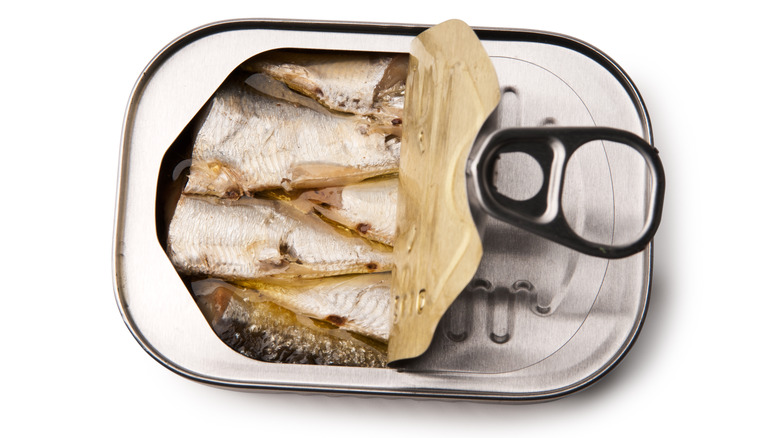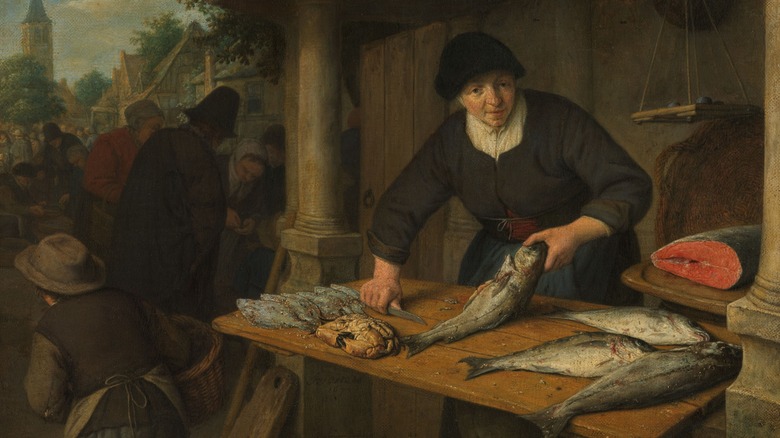What You Need To Know About Fishwife From Shark Tank
The sharks of "Shark Tank" were swimming in it last night, as the founder of seafood startup Fishwife made their pitch for an investment in sustainable, upscale tinned fish. Entrepreneur Becca Millstein and tv writer Caroline Goldfarb launched Fishwife in 2020 with an eye towards creating a domestic brand that mirrors the quality and flavor of conservas, the popular — and at times pricey — tinned seafoods of the Iberian peninsula.
Salmon, tuna, mackerel, anchovy, trout, and sardines get some serious culinary shine inside of Fishwife's stylish tins where they're packaged with ingredients like tart, salty preserved lemon, chili flakes, and Sichuan peppercorns. Many of the fish are also given a smoky finish to boot. Fishwife sells them in packs of three that range from $27 to $39 and in specialty-themed bundles, such as Starter Pack, Spicy Hot Trio, and Classic Smoky Trio, which retail on the company's website for between $33 and $42. There is also a Shark Tank Bundle for $84 that provides customers with an overview of Fishwife's tasty wares via eight tins — one each — of the company's entire product line.
Selling sustainable sourcing
Sustainability is a critical component of Fishwife's model. Overfishing and unscrupulous farming practices in the seafood industry have depleted fish populations to dangerous levels and wrought havoc on the environment. That's why the company has committed to sourcing only sustainable and ethically raised and caught fish for its tins.
The company gets its tuna from small-scale British Columbian fishermen who eschew reckless and indiscriminate net fishing for more arduous, but precise line-fishing. It acquires wild-caught mackerel in the Northeast Atlantic with the help of family-owned boats. Salmon comes to Fishwife from the Norwegian finfish farm Kvarøy Arctic which carries the Fair Trade USA seal and raises salmon in the Arctic Circle. Closer to home, Fishwife uses rainbow trout that comes from an Idaho trout farm with the distinction of being the nation's only ASC-certified operation. Across the product line, Fishwife seafood is free from antibiotics, growth hormones, and genetic engineering.
What's in a name?
So what exactly is a fishwife? This term has its roots in commerce, making it fitting for a startup to adopt as its moniker. In maritime communities, especially in the United Kingdom, where commercial fishing was a backbone of the economy, men were often the fishers and, as such, were on ships at sea plying their trade. But the seafood they hauled in needed to be brought to market, a task which fell to their wives and daughters. These women were referred to as fishwives, which is seemingly straightforward.
But the term took on a double meaning that impugned the character of these independent, strong women. The harsh realities of running their own businesses and attracting customers for their highly-perishable wares at market meant that fishwives had to be outspoken, confident, and competitive, characteristics that didn't mesh with the feminine ideal at the time. Fishwife came to refer to any woman regarded as brash, loud, crass, and vulgar to a fault. To "swear like a fishwife" was applied to those women not considered properly demure and polite.
Confidence, entrepreneurism, and outspokenness are far from poor qualities in a person, though, especially one launching and growing a small company. That's why Millstein and Goldfarb settled on fishwife as the name of their company. Harnessing the power of the term while simultaneously deflating it, Fishwife continues in the spirit of those women who proudly bucked convention and charted their own business destinies.
A spicy collaboration
If you're a fan of food with an ear to the ground for new hot products, then you've surely heard of white-hot chili crisp brand Fly by Jing. The company, founded by chef Jing Gao, offers a line of crunchy condiments, sauces, and spices packed with assertive flavors of Chinese cuisine. Garlic, onions, chili flakes, sesame seeds, peanuts, and more dance with tingling Sichuan — or Szechuan — peppercorns in oil. Fly by Jing's flavor-packed products can be used to accentuate and spice everything from stir-fries to soups.
But those uses are just the tip of the iceberg, and the robust condiments work well with mild flavors, such as seafood. Recognizing the synergy, Fishwife has collaborated with Fly by Jing on a version of their smoked salmon brined in salt, garlic, and brown sugar and packed in Fly by Jing's Sichuan Chili Crisp. The product is pungent, sweet, smoky, and spicy in the way that only Sichuan peppercorns are.
Let's make a deal
Tinned seafood may not be to everyone's taste, but it seems like a shoo-in for sharks, right? Of course, "Shark Tank" is focused on financials over flavor, and the assembled Sharks — Mark Cuban, Lori Greiner, Damon John, Kevin O'Leary, and guest shark Candace Nelson — were ready to hear about Fishwife's origin and plan for growth. Co-founder and CEO Millstein said the company is projected to hit 1.5 million in blended average unit sales for a total of $8 million in revenue.
Based on those numbers O'Leary floated a $350,000 loan at 11% interest with a 5% stake in return. John offered Millstein a $350,000 straight investment deal that included no equity ownership, but a $0.15 royalty on all cans Fishwife sells in perpetuity. While Millstein mulled it over, Cuban wished her luck but bowed out as the product was not up his alley. Nelson, though, roped in Greiner — an expert in consumer packaged goods — for an offer of $350,000 for a 10% stake in Fishwife. Millstein countered with an offer of a six percent stake in the company and one percent each in advisory shares in return for the $350,000, and much like chum in the water, Nelson and Greiner gobbled it up.




